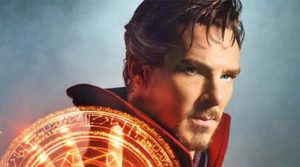It has been awhile since I’ve seen a movie in the theater. With the prices continuing to rise and the material often disappointing me on multiple levels, I haven’t been so interested in going; that is until I heard about Doctor Strange. Several of my Facebook friends have posted that the movie was directed by a Biola University alum, Scott Derrickson. As you’ve probably already guessed, he’s a Christian. As you may not have guessed, however, he’s a Christian who  directs horror films. Now there’s a twist! He believes that the horror genre allows him to explore the questions about the supernatural, as well as good and evil, in a profound way. You can read more about his work on Doctor Strange in this great article, The Complex Faith of “Doctor Strange” Director Scott Derrickson.
directs horror films. Now there’s a twist! He believes that the horror genre allows him to explore the questions about the supernatural, as well as good and evil, in a profound way. You can read more about his work on Doctor Strange in this great article, The Complex Faith of “Doctor Strange” Director Scott Derrickson.
I’m already a Benedict Cumberbatch fan from his work in the BBC’s Sherlock Holmes. When you add in that a fellow Biolan directed the film, I’ve got to go see it in the theater. While the film has great acting, CGI, effects and cinematography, what really caught my attention was the unapologetic handling of atheistic materialist philosophy, as well as of the “science is the only way to know truth” dogma. This film didn’t try to contextualize the Doctor Strange story with these current cultural ideas. Rather, in the movie, the main character discovers that his human knowledge, while at the top of his scientific field, is limited by his atheistic materialism. He discovers the power beyond human control to which humans must surrender if they really want to do great things. Human existence isn’t as much about gaining knowledge as it is about letting go of control and of egocentric self-preservation.
(HUGE SPOILERS forthcoming!)
In one stunning moment of the film, Doctor Strange must die over and over in order to live for something greater than himself. In the struggle against evil, he literally has to surrender the very life he’s trying so hard to restore so that he may truly live. It’s a powerful reflection of the words of Jesus calling us to deny ourselves, carry our cross daily and follow him (Luke 9:23-25). Whether this imagery was intentional or not, the scene carries a powerful depiction of self-denial and surrender. Strengthening this imagery is another poignant moment in which The Ancient One tells Doctor Strange that life is not “about you.” It’s a powerful lesson to live for the sake of others; that our lives should not be so focused on ourselves. Our current society stresses the autonomy of the individual as one of the greatest moral values. We’ve been on this path of subjectivism for some time, so it’s refreshing to see a film that overtly denies this culturally normalized view.
If you’ve ignored my spoiler alerts and read the article in full, I recommend seeing this film and discussing it with the family. While the content is too mature for young kids, preteens and up should be fine. The film will provide plenty of material to discuss within a Christian spiritual context; especially that of conforming of our lives to Christ.
